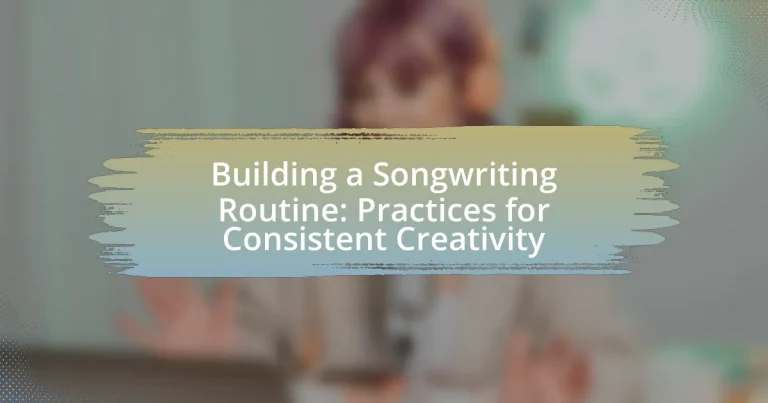The article focuses on the importance of establishing a songwriting routine to enhance creativity and productivity for songwriters. It outlines the key components of an effective routine, including consistent practice, a dedicated workspace, and the incorporation of creative exercises. The article also discusses the psychological benefits of having a routine, such as reduced anxiety and improved mental well-being, as well as strategies for overcoming common challenges like creative blocks and procrastination. Additionally, it highlights the role of experimentation and collaboration in fostering creativity, and provides practical tips for building a successful songwriting routine.

What is a Songwriting Routine?
A songwriting routine is a structured approach that songwriters use to consistently create music. This routine often includes specific times set aside for writing, techniques for generating ideas, and practices for refining lyrics and melodies. Research indicates that establishing a regular schedule can enhance creativity and productivity, as seen in studies showing that habitual practice leads to improved skill development in various artistic fields.
Why is a songwriting routine important for creativity?
A songwriting routine is important for creativity because it establishes a structured environment that fosters consistent output and idea generation. Regular practice helps songwriters develop their skills, refine their unique voice, and overcome creative blocks. Research indicates that routines can enhance creativity by providing a reliable framework within which spontaneous ideas can flourish, as seen in studies on habit formation and creative performance. For instance, a study published in the journal “Psychology of Aesthetics, Creativity, and the Arts” found that individuals who engage in regular creative practices report higher levels of creative self-efficacy and output. Thus, a dedicated songwriting routine not only cultivates discipline but also enhances the overall creative process.
How does a routine influence the songwriting process?
A routine significantly influences the songwriting process by providing structure and consistency, which can enhance creativity and productivity. When songwriters establish a regular schedule for writing, they create a dedicated time and space that fosters focus and minimizes distractions. Research indicates that habitual practices can lead to improved creative output; for instance, a study published in the Journal of Creative Behavior found that individuals who engaged in regular creative routines reported higher levels of creative performance and satisfaction. This structured approach allows songwriters to develop their skills over time, experiment with new ideas, and ultimately produce more cohesive and polished work.
What psychological benefits come from having a routine?
Having a routine provides significant psychological benefits, including reduced anxiety and improved mental well-being. Routines create a sense of predictability and control, which can alleviate feelings of uncertainty and stress. Research indicates that structured daily activities can enhance mood and promote a sense of accomplishment, as individuals are more likely to complete tasks when they follow a consistent schedule. A study published in the journal “Psychological Science” found that individuals with regular routines reported higher levels of life satisfaction and lower levels of anxiety. This evidence supports the notion that establishing a routine can foster a more stable and positive mental state.
What are the key components of an effective songwriting routine?
An effective songwriting routine consists of consistent practice, a dedicated workspace, and the incorporation of various creative exercises. Consistent practice allows songwriters to develop their skills and refine their craft over time, leading to improved songwriting abilities. A dedicated workspace fosters an environment conducive to creativity, minimizing distractions and enhancing focus. Incorporating creative exercises, such as free writing or melody improvisation, stimulates inspiration and encourages exploration of new ideas. Research indicates that routines can enhance creativity by providing structure while allowing for spontaneous creativity within that framework.
What time of day is best for songwriting?
The best time of day for songwriting is typically early morning. Research indicates that cognitive function and creativity are often heightened after a good night’s sleep, making mornings an ideal time for creative tasks. A study published in the journal “Thinking, Skills and Creativity” found that individuals tend to perform better on creative tasks in the morning compared to later in the day, as mental fatigue accumulates. Therefore, early mornings provide a fresh mindset conducive to songwriting.
How can environment impact songwriting productivity?
The environment significantly impacts songwriting productivity by influencing creativity, focus, and emotional state. A conducive environment, such as a quiet space with minimal distractions, fosters concentration and allows songwriters to immerse themselves in their work. Research indicates that natural light and pleasant surroundings can enhance mood and cognitive function, which are crucial for creative processes. For instance, a study published in the Journal of Environmental Psychology found that individuals working in environments with natural elements reported higher levels of creativity and satisfaction. Conversely, chaotic or uncomfortable settings can hinder productivity by causing stress and distraction, ultimately stifling the songwriting process.
How can one establish a consistent songwriting routine?
To establish a consistent songwriting routine, one should set aside dedicated time each day or week specifically for songwriting. This practice creates a structured environment that fosters creativity and discipline. Research indicates that regular practice enhances skill development; for instance, a study by Ericsson et al. (1993) highlights that deliberate practice leads to expertise in various fields, including music. By committing to a schedule, songwriters can cultivate a habit that encourages the flow of ideas and the refinement of their craft.
What steps should be taken to create a personalized routine?
To create a personalized routine, begin by assessing your individual goals and preferences related to songwriting. Identify specific times of day when you feel most creative and allocate those periods for focused songwriting sessions. Next, establish a consistent schedule that includes daily or weekly writing practices, ensuring to incorporate breaks to maintain mental clarity. Additionally, track your progress and adjust your routine based on what works best for you, as flexibility can enhance creativity. Research indicates that structured routines can significantly improve productivity and creativity in artistic endeavors, as seen in studies on habit formation and creative output.
How can one overcome obstacles to maintaining a routine?
To overcome obstacles to maintaining a routine, one should establish clear goals and create a structured schedule. Setting specific, measurable, achievable, relevant, and time-bound (SMART) goals helps in providing direction and motivation. A structured schedule allows for dedicated time slots for songwriting, which can enhance consistency. Research indicates that routines can improve productivity by reducing decision fatigue, as noted in a study published in the journal “Psychological Science,” which found that individuals with established routines experience less stress and greater focus. Additionally, incorporating flexibility within the routine can help accommodate unexpected changes, making it easier to stay on track.
What practices can enhance creativity within a songwriting routine?
Engaging in diverse musical influences enhances creativity within a songwriting routine. By exploring various genres, artists, and cultural sounds, songwriters can expand their creative palette, leading to innovative ideas and unique compositions. Research indicates that exposure to a wide range of musical styles stimulates cognitive flexibility, which is crucial for creative thinking. For instance, a study published in the journal “Psychology of Music” by Hargreaves and North (2011) found that varied musical experiences contribute to greater creative output in musicians. Additionally, setting aside dedicated time for free writing or improvisation can further unlock creativity, as it encourages spontaneity and reduces self-censorship, allowing for more authentic expression.
How can collaboration influence songwriting creativity?
Collaboration can significantly enhance songwriting creativity by introducing diverse perspectives and ideas. When songwriters work together, they combine their unique experiences, musical styles, and emotional insights, which can lead to innovative concepts and richer lyrical content. Research indicates that collaborative songwriting often results in more varied and complex compositions, as seen in successful partnerships like Lennon-McCartney, where their differing influences created timeless music. This blending of creativity not only fosters a supportive environment but also encourages experimentation, ultimately leading to a more dynamic songwriting process.
What role does experimentation play in songwriting?
Experimentation plays a crucial role in songwriting by fostering creativity and innovation. It allows songwriters to explore new sounds, structures, and lyrical themes, which can lead to unique compositions. For instance, artists like David Bowie and Radiohead have utilized experimentation to redefine genres and push musical boundaries, resulting in critically acclaimed works. This approach not only enhances the artistic process but also engages listeners by offering fresh perspectives and unexpected elements in music.
How can one measure the effectiveness of their songwriting routine?
One can measure the effectiveness of their songwriting routine by tracking the quantity and quality of songs produced over a specific timeframe. For instance, maintaining a songwriting journal that records the number of completed songs, the time spent on each, and feedback received can provide concrete metrics for evaluation. Additionally, analyzing listener engagement metrics, such as streaming numbers or social media interactions, can serve as indicators of the songs’ impact. Research indicates that consistent practice and reflection lead to improved songwriting skills, as evidenced by a study published in the Journal of Creative Behavior, which found that structured routines enhance creative output and quality.
What indicators show improvement in songwriting skills?
Indicators that show improvement in songwriting skills include increased lyrical complexity, enhanced melodic structure, and greater emotional resonance in the songs. As songwriters develop their craft, they often demonstrate a wider vocabulary and more sophisticated themes in their lyrics, which reflects a deeper understanding of storytelling and emotional expression. Additionally, improved melodic structure can be observed through more varied chord progressions and innovative hooks, indicating a stronger grasp of musical composition. Research has shown that songwriters who engage in regular practice and feedback loops tend to produce work that resonates more with audiences, as evidenced by increased listener engagement and positive critiques from peers.
How can feedback be integrated into the routine for growth?
Feedback can be integrated into the routine for growth by establishing regular review sessions where individuals assess their work and receive constructive criticism. This practice allows songwriters to identify strengths and weaknesses in their compositions, fostering continuous improvement. Research indicates that feedback enhances learning outcomes; for instance, a study by Hattie and Timperley (2007) in “Review of Educational Research” found that effective feedback can significantly boost performance by clarifying goals and providing actionable insights. By incorporating feedback into their creative process, songwriters can refine their skills and develop a more effective songwriting routine.
What are some common challenges faced in maintaining a songwriting routine?
Common challenges faced in maintaining a songwriting routine include lack of inspiration, time constraints, and self-doubt. Lack of inspiration can hinder creativity, making it difficult for songwriters to generate new ideas consistently. Time constraints often arise from balancing other responsibilities, which can limit the time available for songwriting. Self-doubt can lead to procrastination or avoidance of the songwriting process, as writers may question their abilities or the quality of their work. These challenges are frequently reported by songwriters and can disrupt the flow of a consistent creative practice.
How can procrastination be addressed in the songwriting process?
Procrastination in the songwriting process can be addressed by establishing a structured routine that includes dedicated time for writing, setting specific goals, and minimizing distractions. A consistent schedule helps to create a habit, making it easier to engage in the creative process regularly. Research indicates that individuals who set clear, achievable goals are more likely to complete tasks, as demonstrated in a study published in the Journal of Applied Psychology, which found that goal-setting significantly enhances performance and reduces procrastination. Additionally, techniques such as the Pomodoro Technique, which involves working in focused bursts followed by short breaks, can further enhance productivity and reduce the tendency to procrastinate.
What strategies can help in dealing with creative blocks?
To effectively deal with creative blocks, one can implement strategies such as setting a structured routine, engaging in free writing, and taking breaks to reset the mind. Establishing a consistent songwriting schedule helps create a habit, which can reduce anxiety around creativity. Free writing allows for uninhibited expression, enabling ideas to flow without self-censorship, thus often leading to breakthroughs. Research indicates that taking breaks can enhance creativity by allowing the subconscious to process information, as shown in studies by the University of California, which found that stepping away from a task can lead to improved problem-solving abilities.
What tips can help in building a successful songwriting routine?
Establishing a successful songwriting routine involves setting aside dedicated time for writing, which enhances creativity and productivity. Consistency in scheduling, such as writing daily or weekly, allows songwriters to develop their skills and generate ideas more effectively. Research indicates that regular practice leads to improved performance; for instance, a study published in the journal “Psychological Science” found that consistent engagement in creative activities fosters greater innovation and idea generation. Additionally, creating a conducive environment free from distractions can further enhance focus and creativity during songwriting sessions.
How can setting goals improve songwriting consistency?
Setting goals can significantly improve songwriting consistency by providing clear direction and measurable milestones for songwriters. When songwriters establish specific, achievable goals, they create a structured framework that encourages regular practice and creativity. Research indicates that goal-setting enhances motivation and focus, leading to increased productivity. For instance, a study published in the “Journal of Applied Psychology” found that individuals who set specific goals performed better than those who did not, demonstrating that goal-oriented approaches can lead to more consistent output in creative endeavors like songwriting.
What resources are available to support a songwriting routine?
Resources available to support a songwriting routine include songwriting apps, online courses, and collaborative platforms. Songwriting apps like GarageBand and Ableton Live provide tools for composing and recording music, while online courses from platforms such as Coursera and MasterClass offer structured learning from experienced songwriters. Collaborative platforms like Soundtrap and BandLab enable songwriters to work with others remotely, fostering creativity and idea exchange. These resources enhance the songwriting process by providing both technical support and opportunities for collaboration, which are essential for developing a consistent songwriting practice.





